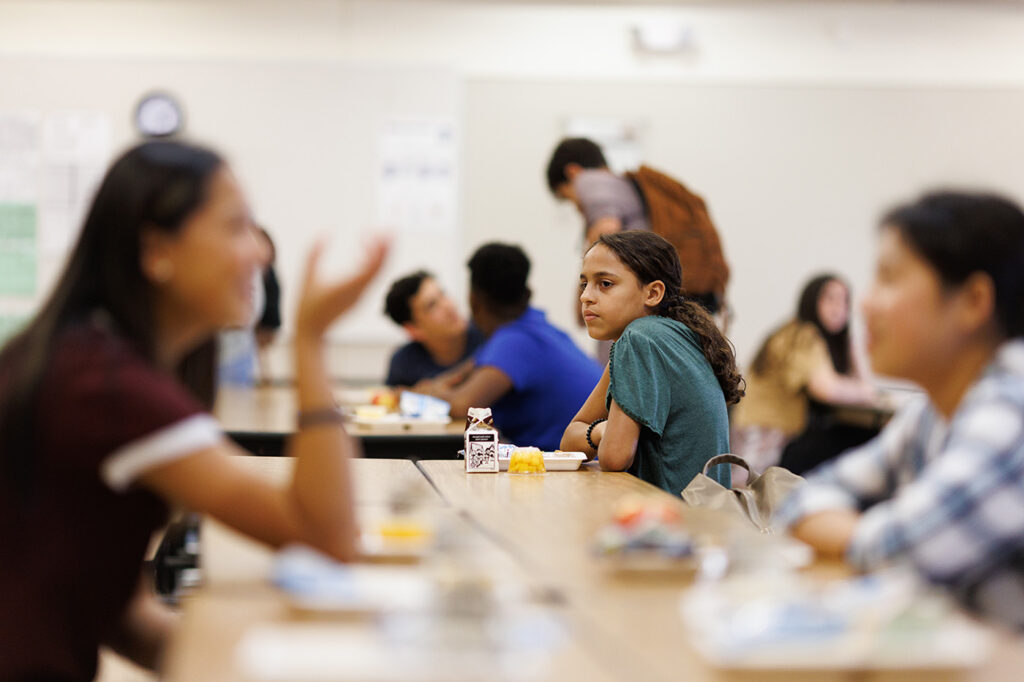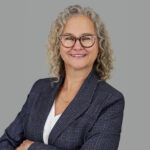In 2022, a $25 million donation from the Ginsburg Family Foundation established the Ginsburg Institute for Health Equity at Nemours Children’s Health. One major initiative of the Institute is the Ginsburg Health Equity Scholars Program. The scholars program seeks to prepare rising members of the healthcare, public health, and scientific workforce to conduct research into children’s health equity and deploy evidence-based programs and resources into underserved communities. Nancy Molello, Executive Director for the Ginsburg Institute, joined us to share details of the Ginsburg Health Equity Scholars Program alongside one of its inaugural scholars Brianna Karim.
Apply to be a Ginsburg Scholar. The deadline is March 15, 2024.
Guests:
Nancy Molello, MSB, Executive Director, Ginsburg Institute for Health Equity at Nemours Children’s Health
Brianna Karim, Health Equity Program Coordinator and Ginsburg Scholar, Nemours Children’s Health
Host/Producer: Carol Vassar
EPISODE 64 TRANSCRIPT
Carol Vassar, podcast host/producer:
Welcome to Well Beyond Medicine, the Nemours Children’s Health Podcast. Each week, we’ll explore anything and everything related to the 80% of child health impacts that occur outside the doctor’s office. I’m your host, Carol Vassar. And now that you are here, let’s go.
Music:
(singing)
Carol Vassar, podcast host/producer:
In 2022, with a very large and very generous donation from the Ginsburg Family Foundation, $25 million. Nemours Children’s Health established the Ginsburg Institute for Health Equity. A major initiative of the institute is to prepare rising members of the healthcare, public health, and scientific workforce to do research into children’s health equity and deploy evidence-based programs and resources into underserved communities. It’s called the Ginsburg Scholars Program, which is currently recruiting for its second cohort of scholars. Nancy Molello is the executive director of the Ginsburg Institute for Health Equity, and she joins me once again to give us details on the Ginsburg Scholars Program, along with one of the inaugural scholars, Brianna Karim. Here’s Nancy Molello.
Nancy Molello, Executive Director, Ginsburg Institute for Health Equity, Nemours Children’s Health:
The Ginsburg Scholars Program is a program that we’ve designed to prepare the next generation of healthcare professionals, students who have graduated from college who are taking a gap year, and we employ them for a year and give them opportunities to build some research skills to be mentored by a clinical researcher here at Nemours Children’s and also an opportunity to work in community. And these experiences will prepare them for their next career opportunity in medical school or work in public health.
Carol Vassar, podcast host/producer:
Talk about why it’s important to train (and) mentor that next generation of health equity leaders.
Nancy Molello, Executive Director, Ginsburg Institute for Health Equity, Nemours Children’s Health:
I think the adage of you can’t be what you can’t see is really critical. So we take in students who are really underrepresented in medicine and give them an opportunity and build their skills so that their applicants, when they do go to apply to graduate school, they have great experience on their resume. They have great connections in the medical profession. They also have an opportunity to work with clinicians and clinical mentors so that they can get great letters of reference, and it makes them really a well-rounded applicant as they’re looking to go to medical school or public health school.
Carol Vassar, podcast host/producer:
Now, Brianna, you are a Ginsburg scholar. What drew you to the program?
Brianna Karim, Ginsburg Scholar:
So in my previous role, I was a clinical research coordinator, and my mentor, Dr. Holly Gooding, she was pivotal in me finding my passion for research, and she inspired me to pursue different research topics and one of them being health disparities in children. And so when I found the Ginsburg Institute for Health Equity, I was drawn to the program, and I really wanted to expand my research skills and be able to connect with different physician researchers, especially at an esteemed children’s hospital like Nemours. And so, I’m here today.
Carol Vassar, podcast host/producer:
Did you have to apply to get in?
Brianna Karim, Ginsburg Scholar:
No. So, actually, I was applying for a position as a health equity program coordinator, and Nancy, being the wonderful person she is, connected me to physician researchers, and I was able to build the program of a Ginsburg scholar while also being a Ginsburg scholar so that our program can improve for future cohorts.
Carol Vassar, podcast host/producer:
So in many ways, you are the inaugural Ginsburg scholar, but under normal circumstances, would folks need to want to apply for this?
Nancy Molello, Executive Director, Ginsburg Institute for Health Equity, Nemours Children’s Health:
Yes, absolutely. Our application just went live a few weeks ago, and we’ve been publicizing in HBCUs at UCF and UF and some other schools in Florida. You need to be a Florida resident, but you can have gone to school anywhere else in the country, and you can come back for the summer. We’re looking for candidates, as I said, who are underrepresented in medicine so that as we grow, this program will create a cohort for the scholars as they graduate from medicine, and they’re looking for residency that have had the opportunity to work together to really build those health equity skills. And that’s another key piece is that we’re focused on building health equity skills so that when they graduate, they can look at some disparities in care that happen in our country and can really be ahead of the game of, I’ve worked on a research project where they’re looking at, for example, asthma, and why is there a prevalence of children from Latino background, why do they have a higher rate of asthma in central Florida? What’s that disparity in care?
So they’re starting their career, already thinking, already shaped by having a lens of health equity that I think will give them a leg up as they continue their career. As we were developing the framework for the Ginsburg Scholars and our mission and our vision, we engaged the five scholars that we have right now to help us come up to determine what the mission is and what the framework is, and how we can help them get to the next stage in their career. Brianna, maybe you could talk just for a minute about why the component of community work and community engagement was so critical to the scholars. What does that bring to you?
Brianna Karim, Ginsburg Scholar:
Yeah, I think community engagement is super important because we’re able to see our research and our ideas come to fruition, and someone being from Orlando, it’s really nice to see the different aspects of our research come to life in the central Florida community. So, for example, seeing the nutrition education project go into the Boys and Girls Club and seeing all these children be able to grow their fruits and vegetables and learn the importance of nutrition. It’s really nice to just see it come to life, and it’s not just something that’s written on paper and submitted to the IRB. It’s something that we can see right in front of our eyes and see the positive effects.
Carol Vassar, podcast host/producer:
Well, I was going to ask, do you think having that knowledge and that experience informs the directions they take as they move on to graduate school or medical school?
Nancy Molello, Executive Director, Ginsburg Institute for Health Equity, Nemours Children’s Health:
Absolutely. I think it helps them really have an understanding of the world view that maybe they did not get in college or in high school, and maybe they have lived experience that can say things are different because of my gender or because of where I grew up and in a rural community. So they’ve had lived experiences, perhaps, but they can now have a language around how that impacts their health. If you think about it, where we live, where we work, and where we play, especially for children, really impacts how healthy they are. So I think the Ginsburg Scholars really have an opportunity to see in real-life practice what those health disparities mean on the ground for a little child who comes to Nemours.
Carol Vassar, podcast host/producer:
Brianna, I want to ask you, what has been your experience? What have you liked about what you’ve done here with the Ginsburg Scholars Program?
Brianna Karim, Ginsburg Scholar:
Yeah. My experience has been incredibly rewarding, from submitting IRB protocols to teaching children about regulating their emotions. Everything’s just been a learning opportunity, and although I come from a research background, I’ve continually learned new things every day, and it’s been a really great path.
Carol Vassar, podcast host/producer:
What kinds of projects have you been working on?
Brianna Karim, Ginsburg Scholar:
I’ve been here for about half of a year, and in my time I’ve been a part of several nutrition education projects that’s focusing on teaching patients about their nutrition and how that impacts health and disease, as well as been a part of parent management trainings for families with children diagnosed with ADHD. So, incredibly rewarding.
Carol Vassar, podcast host/producer:
And you’re going on to medical school. How do you think what you’ve learned and experienced as a Ginsburg scholar will inform your career path moving forward, your education, and your career?
Brianna Karim, Ginsburg Scholar:
Yeah, so, the Scholars Program has really inspired me to continue pursuing research. So as a medical student, research is very important and not only for your residency applications but it’s very important to be able to understand the research process because medicine is continuously changing, and it’s important to stay up-to-date with new technologies and new advancements, especially in the health equity realm. And so the Ginsburg Scholars program has informed me about these different topics and to be aware of the social determinants of health and how that can affect your patients moving forward.
Carol Vassar, podcast host/producer:
Do you have any first-hand experience without breaking any privacy laws or policies that you can share with us that really drive home the fact that this is an important program?
Brianna Karim, Ginsburg Scholar:
So I’ve had experience with a lot of children in parent management training where I’m able to teach them that being angry or being upset, being sad, and that’s okay. And a lot of times we say that you should always be happy, and that’s not the case. Teaching these children that it’s okay to be able to feel a certain way and be accepted for what you feel. That’s been really nice to teach children, and it’s something that I can hopefully continue as a physician in the future.
Carol Vassar, podcast host/producer:
Are you going to stay in the pediatric realm?
Brianna Karim, Ginsburg Scholar:
I really hope so. I’m very passionate about pediatrics, and I love working with kids and families. I think it’s just a really comprehensive field.
Carol Vassar, podcast host/producer:
Nancy, as far as the scholars are concerned, what research or policy projects are underway that you see as promising?
Nancy Molello, Executive Director, Ginsburg Institute for Health Equity, Nemours Children’s Health:
Well, this year, we’ve had five scholars, and we have 10 mentors, and each of them are working on various projects. I think two of the projects that I would highlight would be the Food Is Medicine Project that we have. So, the Ginsburg Institute awarded a grant, a community grant. Our first awardee has been the 4Roots Foundation here in Orlando and to the Boys and Girls Club of Orlando, and the project is all about culinary medicine. So, the 4Roots Foundation will be putting a farm on the site of the Boys and Girls Club, and our clinician leader, Hadeel Haddad, will be developing a Food as Medicine Program. The 4Roots Foundation will be teaching the children at the Boys and Girls Club about entrepreneurship and how to sell their fruits and vegetables to the community. So it’s a really comprehensive program, and our scholars will be working on the site in numerous ways, helping at the Boys and Girls Club, helping with 4Roots. We’ll all be as a team, volunteering to help do some of the farming and thinking about how we can help with the teaching around food as medicine and culinary medicine.
So, I think in helping our scholars really understand those health equity principles and what that means in terms of research and then giving them an opportunity to work in community and really see how that impacts community, that’s really what I’m most proud of that we’re doing with our scholars.
Carol Vassar, podcast host/producer:
The partnership with the Boys and Girls Club, does that mean that the boys and girls start from the beginning, grow whatever it is that’s being grown, and then ultimately take it home?
Nancy Molello, Executive Director, Ginsburg Institute for Health Equity, Nemours Children’s Health:
Yes. So the 4Roots Foundation, which is an incredible organization, an incredible partner, they’ll be teaching the boys and girls how to grow fruits and vegetables. They’ll be helping them bring it home. They’ll be eating it for lunch. So there’ll be lettuce and tomatoes, and peppers, and they’ll be making a salad at the Boys and Girls Club and then eating that salad, learning about how food can be medicine, but also seeing how you can grow fruits and vegetables and in an urban environment so that if you’re living in a townhouse or an apartment, where on my porch could I put a tomato plant? How could I grow lettuce? How those things are important. John Rivers, who runs the 4Roots Foundation, we’ve met with him a number of times and toured their farm and with the scholars, and one of the stories he talks about is that they have given fruits and vegetables in schools.
Then the children then go home with a box of vegetables, fruits, and vegetables. And the next day, the teacher said, “How did your parents like the box of fruits and vegetables, and did you guys try new things that you hadn’t tried before?” And the students said, “Oh, my mom said we couldn’t eat that because they grow from the dirt.” They weren’t familiar with the fact that fruits and vegetables come from the ground. Their experience has been that they really come from a can or from a frozen bag. So, I think this program gives the community an opportunity to have children learn something new, but it also gives our scholars an opportunity to work in community, with community, for community, and how wonderful that will be for the next generation of physicians who’ve really experienced on the ground what health equity means to a young boy or girl who maybe lives in a hotel, maybe is homeless right now, or maybe comes from a disadvantaged background or a background that’s different than what they have experienced.
Carol Vassar, podcast host/producer:
Brianna, for potential scholars, people who are thinking about maybe this is a program for me, what would you say to encourage them?
Brianna Karim, Ginsburg Scholar:
I would say that I definitely recommend this opportunity. There’s a lot of unlimited learning opportunities, and you’re able to connect with not only the community but also physician researchers. And you’re a part of a dynamic team that’s staying up-to-date with the different aspects of health disparities, and it’s wonderful to be a part of that change.
Carol Vassar, podcast host/producer:
Brianna Karim is a Ginsburg Scholar with the Ginsburg Institute for Health Equity at Nemours Children’s Health. She was joined in conversation by Nancy Molello, executive director of the Ginsburg Institute for Health Equity.
Music:
(singing)
Carol Vassar, podcast host/producer:
If you are interested in becoming a Ginsburg Scholar, applications are available using the link in the show notes for this podcast. What efforts do you see in your community that are working to equal the playing field when it comes to children’s health? Leave us a voicemail on our podcast website, nemourswellbeyond.org. That’s nemourswellbeyond.org. There, you can also find all of our past podcast episodes, subscribe to the podcast, and leave a review. Our production team for this episode includes Che Parker, Cheryl Munn, Susan Masucci, and Lauren Teta.
So, when it comes to health, does zip code matter more than genetic code? That’s the question we’ll be asking of Tony Iton, who was the keynote speaker at the Ginsburg Institute’s inaugural symposium. Until then, I’m Carol Vassar. And remember, together, we can change children’s health for good well beyond medicine.
Music:
Well Beyond Medicine!
Carol Vassar, podcast host/producer:
Welcome to Well Beyond Medicine, the Nemours Children’s Health Podcast. Each week, we’ll explore anything and everything related to the 80% of child health impacts that occur outside the doctor’s office. I’m your host, Carol Vassar, and now that you are here, let’s go.
MUSIC:
Well Beyond Medicine










